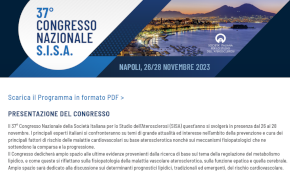 Rivista in lingua italiana
Rivista in lingua italiana
riservata ai Soci SISA
Ultimo numero:
Anno 14 • N.4/2023
SISANews
L'obesità addominale è un fattore di rischio per l'insufficienza cardiaca
L'obesità addominale è un predittore indipendente di ospedalizzazione per insufficienza cardiaca e per eventi cardiovascolari ricorrenti nei pazienti con coronaropatia stabile. È quanto afferma l'Heart and Soul Study che sottolinea che l'associazione tra obesità e malattia cardiovascolare non è mediata da altre comorbidità come gravità della malattia cardiaca pre-esistente, insulino-resistenza, infiammazione, neuroormoni o adipochine.
![]()
Relation of obesity to heart failure hospitalization and cardiovascular events in persons with stable coronary heart disease (from the Heart and Soul Study
Spies C, Farzaneh-Far R, Na B, Kanaya A, Schiller NB, Whooley MA.
Am J Cardiol 2009;104:883-89
Obesity is an independent risk factor for recurrent events among patients with established coronary heart disease (CHD). The goal of the present study was to identify potential mechanisms underlying this association. We measured the waist-to-hip ratio and body mass index in 979 outpatients with stable CHD and followed them for a mean of 4.9 years. We used proportional hazards models to evaluate the extent to which the association of obesity with subsequent heart failure (HF) hospitalization or cardiovascular (CV) events (myocardial infarction, stroke, or CHD death) was explained by baseline co-morbidities, cardiac disease severity, inflammation, insulin resistance, neurohormones and adipokines. Of the 979 participants, 128 (13%) were hospitalized for HF and 152 (16%) developed a CV event. Each standard deviation (SD) increase in the waist-to-hip ratio was associated with a 30% increased risk of HF hospitalization (unadjusted hazard ratio [HR] 1.3, 95% confidence interval [CI] 1.1 to 1.6). This association was not attenuated after adjustment for potential mediators (HR 1.6, 95% CI 1.2 to 2.1). Likewise, each SD increase in the waist-to-hip ratio was associated with a 20% greater risk of CV events (unadjusted HR 1.2, 95% CI 1.0 to 1.4), and this remained unchanged after adjustment for potential mediators (adjusted HR 1.3, 95% CI 1.0 to 1.5). The body mass index was not associated with the risk of HF or CV events. In conclusion, abdominal obesity is an independent predictor of HF hospitalization and recurrent CV events in patients with stable CHD. This association does not appear to be mediated by co-morbid conditions, cardiac disease severity, insulin resistance, inflammation, neurohormones, or adipokines.

Area Soci
Eventi



 SISA LIPID ACADEMY - Corso avanzato di lipidologia clinica
SISA LIPID ACADEMY - Corso avanzato di lipidologia clinicaModena, 22-23 Giugno 2023
[continua a leggere]Giornale Italiano Arteriosclerosi
HoFH today
 Rivista Italiana della
Rivista Italiana della
Ipercolesterolemia
Familiare Omozigote
Anno 5 • N.1/2023
Rivista NMCD
Diateca
[continua a leggere]
[continua a leggere]
Newsletter
il vostro indirizzo di posta elettronica
Progetto LIPIGEN

Nuovo sito dedicato al Progetto LIPIGEN
Progetto LIPIGEN - Vecchio portale
E' necessario essere loggati come utente
Lipigen per poter accedere alla pagina
PROject Statin Intolerance SISA
PROSISA – PROject Statin Intolerance SISA
E' necessario essere loggati come utente
PROSISA per poter accedere alla pagina
GILA - Lipoprotein Aferesi
Gruppo Interdisciplinare Lipoprotein Aferesi
(Accesso Gruppo GILA-Lipoprotein Aferesi)
E' necessario essere loggati come utente del Gruppo GILA per poter accedere
Gruppo Interdisciplinare Lipoprotein Aferesi
(Documentazione ad accesso libero)
Pagina informativa per medici e pazienti








